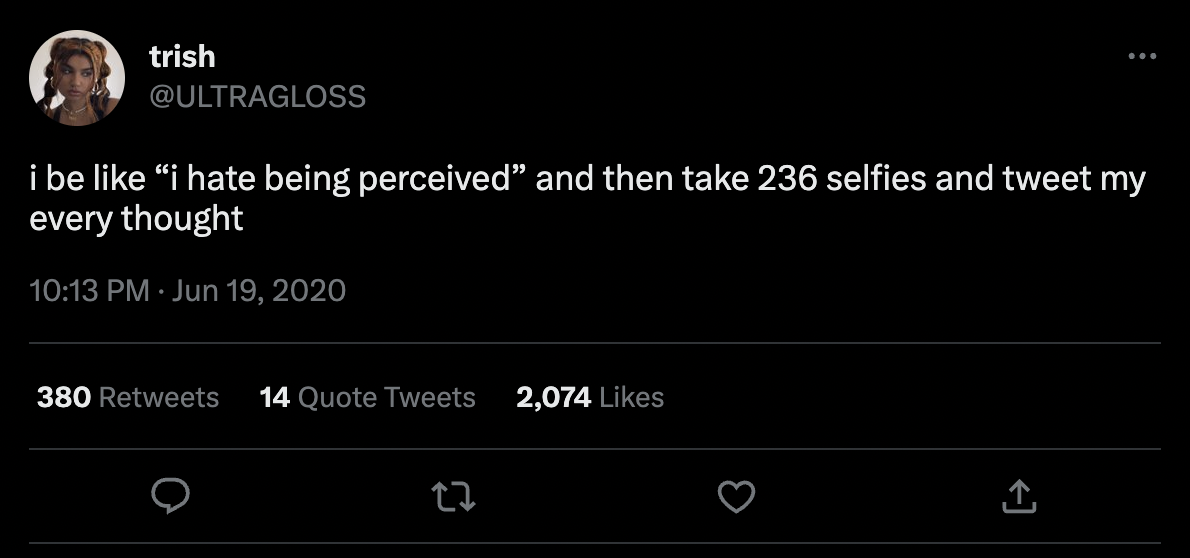02/21/23
Do Not Look At Me
on being perceived
I first joined social media when I moved to Canada in 2010 at the age of 13. Living in India prior to this, I had no internet, no social media, no computer. Sometimes I reflect on the fact that I spent the majority of my childhood without internet access and think that it’s crazy how much things have changed, since my online presence in the intervening years has shaped 90% of my worldview. I was very lucky because when I first got online, Facebook was exploding in the Western hemisphere. The Zuck was in his prime. From the day I arrived in Canada until about two years ago I became a heavy consumer of social media, first of facebook, and later twitter, instagram, and tiktok. And until January of this year, I was also a creator on social media (I use the term ‘creator’ here loosely; I had 200 followers on tiktok). As a consumer, I used social media to follow my friends, influencers, celebrities, brands, meme pages, pages of the fake nonprofits people would make to get into college (which, side note, is a fascinating phenomenon in and of itself). As a creator, I made 250 daily vlogs on tiktok just last year and documented almost every day of my life in grad school in 2021. I justified my vlogging as wanting to document my life for memories, which I did, and to story-tell via video editing (an interest of mine), which I also did. However, looking back on it, I think it was primarily a coping mechanism. 2022 was a tough year and while every single possible thing felt as though it were falling apart, I used social media to paint an idyllic picture of an uncomplicated, carefree, romanticized version of my life. My vlogs are not representative of how I was feeling or what was going on. I only captured the highlights. This attitude towards capturing highlights meant that I wanted to create highlights. I made my days full of things I enjoyed. From that perspective, social media might have saved me. It provided connection. It provided validation. It provided a reason to keep going because tomorrow would be another day to record and post!
I haven’t been creating on social media for a while now, and I stopped consuming (lurking) the last of social media (specifically tiktok) in the beginning of this year to put an end to this endless cycle of creation and consumption.
The past couple of years, I realized that I had become insanely paranoid about being perceived. So I unintentionally and unconsciously became insanely private, afraid to even briefly appear in a friend’s social media post. I didn’t want anyone to know what I was doing, or where I was. Life was great, and it felt like my little secret.
Esse est percipi
"To be is to be perceived" or esse est percipi, is a phrase attributed to British empiricist, George Berkeley. With this phrase, Berkeley wanted to communicate the idea that the things around us are all ideas. In other words, their existence depends on perception or being perceived.
When we become worried about our image, we start to question – did I look cool enough to X person from a certain facet of my life, while also nonchalant enough to Y person from a different aspect of my life? We become uneasy about being perceived as just another person. We all want to be special and different and portray to have these great wonderful lives that are better than the people we compare ourselves to, people we secretly want to be like. This fills the anxious void in the moment, but if we aren’t being real, are we real? We begin to question the veracity of our portrayal. But it turns out, existing means being perceived, in all its forms. And we can be seen right through the portrayal.
To read more of my thoughts surrounding this topic, passive surveillance, and intimacy – I wrote an essay with my friend Preetha on our shared substack publication.
